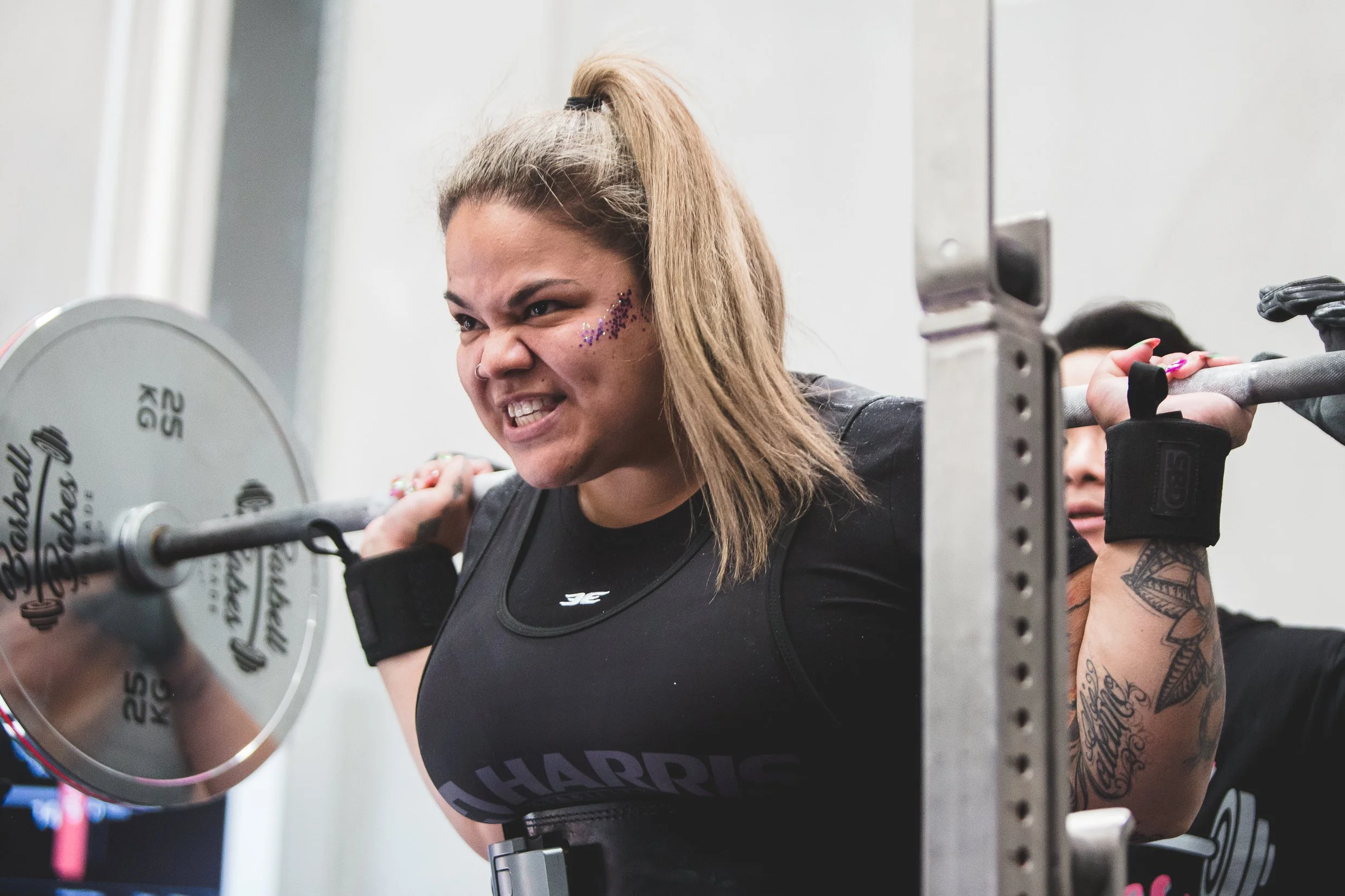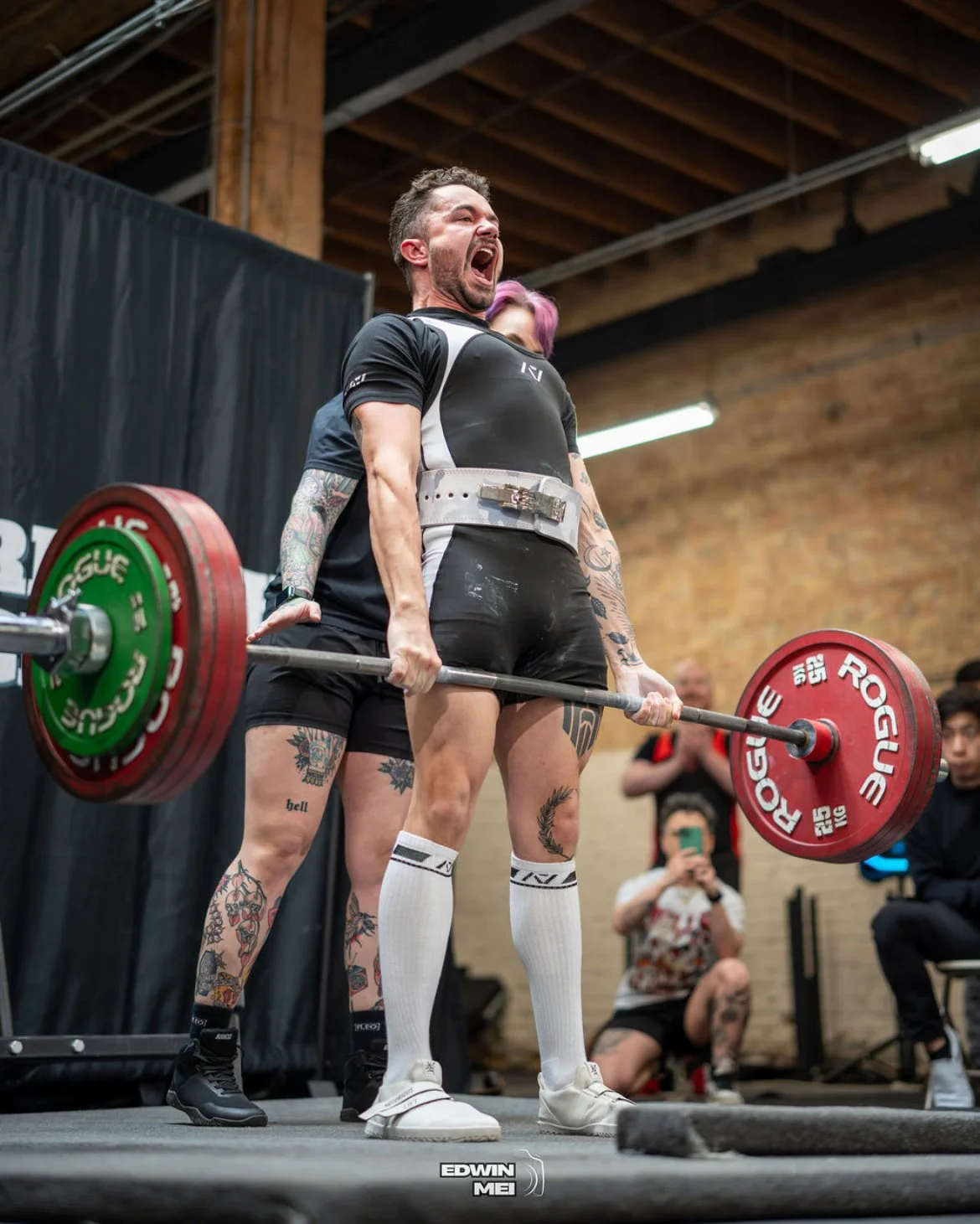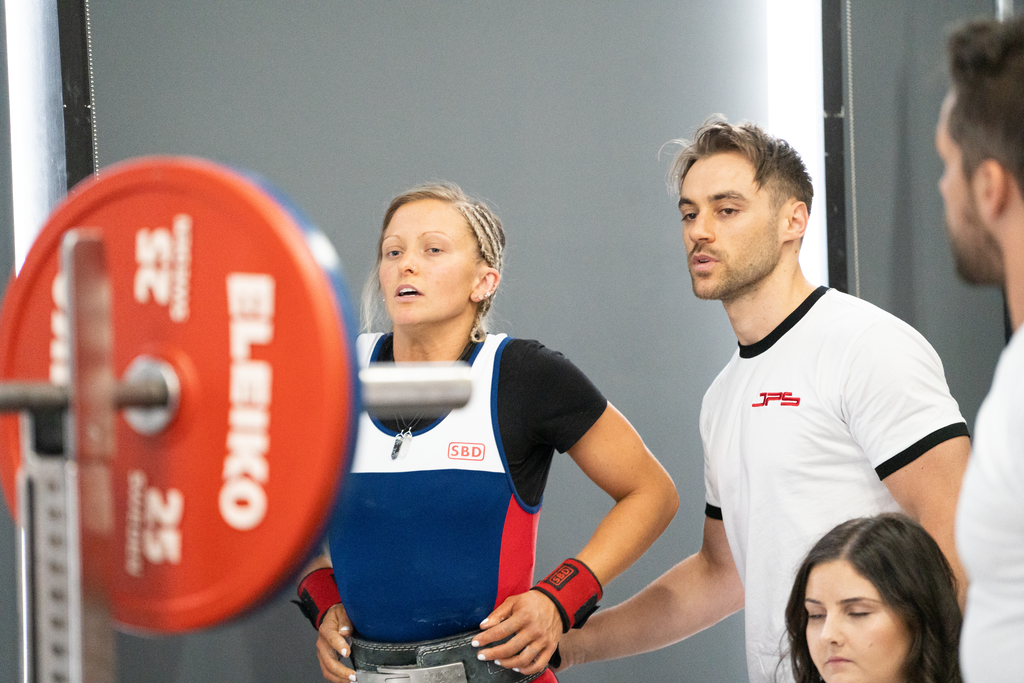15 Reasons Beginners Procrastinate Their First Powerlifting Meet (and Why They Shouldn’t)
Putting yourself out there on the powerlifting platform is extraordinarily vulnerable. It is exceptionally brave to put yourself in view of the public and say “I have worked really hard on this thing, it is important to me, I’ve never done it before like this, but I’m going to try". It’s only natural to have fears and reservations.
Personally though, I don’t think fear is a very good reason not to do something. So I’m going to do my best to put some of your fears to rest so that you can let yourself experience how very cool it is to compete in a strength sport.
Here are the 15 most common reasons that I’ve heard in my career working with beginner lifters for why someone is absolutely not ready to enter their first meet, and why I think they’re wrong.
1. “I’m not strong enough yet.”
This is by far the most common reason for resisting a first meet. A lot of lifters make the mistake of comparing themselves to very experienced lifters; or not infrequently, the current national records! No one, absolutely no one, expects you to make waves in your first meet. And no one expects you to be in striking range of any records.
There are a few lenses through which I view this as being a silly reason not to enjoy the sport.
1/ Powerlifting meets are like fun runs. There are people at the City 2 Surf that want to win it; but there are many more people there that want the experience, that want to challenge themselves, that want to see what they’re personally capable of, that want to be able to say they’ve done it, that do it because their friend talked them in to it. Powerlifting meets are the same. You’re allowed to want to win the thing. But you’re also allowed to simply participate.
2/ Being strong and being a good powerlifter are not synonymous. In my time in powerlifting, I have witnessed a lot of very strong people who are kinda bad powerlifters. They make poor attempt selections, they miss lifts on technicalities and they struggle to manage their nerves. You can be very strong, but unless you learn to be a good powerlifting athlete, you won’t display what you’re capable of on the competition platform. Get as much experience competing as you can, as early as you can! That way, when you are very strong, you’re already an experienced athlete. The beginner mistakes, the teething— you’ve already gone through that.
2. “I don’t want to embarrass myself.”
Nobody, absolutely nobody cares about your results as much as you do. We are all our own worst critics. And honestly, we’re all a little vain for thinking that anyone is watching us and scrutinising us as heavily as we are. You’re the main character in your own world; but an extra in many others.
Powerlifting crowds are pretty damn epic. The sport is small and most of us are really excited to have new people involved. Powerlifters love powerlifting, and seeing someone else experience falling in love with it too is so gratifying to watch.
So, most people don’t really care how much you lift. And those that do, are so happy to see you getting in there and taking the first step of a journey in to a new sport!
And to the rare few that have something to say from their arm chairs, I say:
“It is not the critic who counts: not the man who points out how the strong man stumbles or where the doer of deeds could have done better. The credit belongs to the man who is actually in the arena, whose face is marred by dust and sweat and blood, who strives valiantly, who errs and comes up short again and again, because there is no effort without error or shortcoming, but who knows the great enthusiasms, the great devotions, who spends himself in a worthy cause; who, at the best, knows, in the end, the triumph of high achievement, and who, at the worst, if he fails, at least he fails while daring greatly, so that his place shall never be with those cold and timid souls who knew neither victory nor defeat.”
^^ quote gives me goosebumps.
3. “I don’t know the rules.”
As far as sports rules go, it does’t get much more simple than powerlifting. You can learn them quickly. A few recommendations to do so:
1/ Hire a coach. Not a personal trainer, not a strength coach, a powerlifting coach. A strength coach or a PT can get you strong, but that doesn’t mean they have experience in competition day coaching. Hire a powerlifting coach for a few months if you can, or at the very least a few sessions, and ideally to be with you on the day. They’ll teach you everything you need to know. That is their job.
2/ If you haven’t already, go watch some powerlifting competitions. Sit close to the front, and ideally close to a scoreboard. That way you don’t only see the lifting, but how lifters prepare to come out, how coaches prepare them, hear what the coaches say, you can hear the referee commands and learn how to read the score board.
3/ Volunteer at a local powerlifting competition. Powerlifting competitions depend on volunteers so all meet directors would be thrilled to have some extra hands! Volunteering can put you up even closer to the action, perhaps spotting and loading, at the scoring table, or even as a warm up room bouncer. All these roles force you to pay really close attention to what is happening so you’ll learn fast!
4/ You can read the full rule book in less than an hour. While it doesn’t give you practical experience, it at least introduces you to the rules.
You’re not ready to compete because you don’t know the rules? Go learn them. That part is not hard.
4. “I get too anxious performing in front of people.”
Nerves are normal, and one of the best things about sport! Everyone feels them; including and perhaps even more so for those that have been in the game a long time. Nerves mean you care.
Hear me out, would you rather:
a) throughout your life, be able to experience the biggest positive emotions, but also the biggest negative emotions or,
b) move through life only experiencing neutral emotions, no highs nor lows?
Big emotions on competition days is part of what makes it so special! Putting yourself in a high stress environment, testing yourself in the arena of something that is really important to you, and seeing what you’re made of! The thrill, the fear, the highs, and the lows are what make sport so impactful.
5. “I don’t want to wear that one piece suit.”
As per point two, no one really cares what you look like. Nowhere near as much as you do. And it’s not like you’re the only person in the room wearing the onesie. Everyone there is wearing one. One of the members at TSF bought her first soft suit today. Obviously she walked around flexing and I demanded that she do a twirl. Afterwards she said to me “I really like wearing things that tell yourself and the people around you that you’re ready to perform”. I loved that as a perspective. Like she’s not wearing this thing to look fashionable; she’s wearing it because she’s ready to perform.
All that said, wear your suit to training for a week or two before the competition. It might feel a little weird the first time but at least then by competition day, the suit is the least of your worries.
Honestly, they grow on you. I think they’re kinda cool now.
6. “I’ll be so disappointed if I under-perform.”
The ultimate goal of a first competition is to have a good time. Part of enjoying the day is obviously to perform well. A lot of this is the responsibility of your coach— to prepare you for the day, to ensure you know the rules, that you’re executing the lifts in accordance with the rules, that the attempts they are choosing for you are within the the realm of what you’re capable of. They want you to do well. If you trust your coach, you should be fine.
But to safeguard yourself, set some goals for the day that are not performance related. For example,
to pay attention how the competition flows
to learn about what you need on the day to manage your nerves
to communicate your needs to your coach and the other people that are there to support you
to introduce yourself to some other lifters that you’ve not met before
to remember to thank the referees after your final deadlift
All of these objectives can enrich your experience of the day and set yourself up for future success in competition. That way, whether you go 9/9 or not, hit PRs or not, the day can be both fun and insightful; a brilliant experience in it’s own right, and help to set you up for more positive experiences in the future.
7. “I’m still learning technique.”
The reality is that so is everyone. Technique is rarely a set and forget thing. You’ll work on it and continue to develop it for as long as you’re lifting. So if you wait until you’ve “learned technique” to get out on the competition platform, you may well never get there.
Get out there and learn what competing is like while you’re still refining your skills. You’ll gain a lot of feedback about your strengths, weaknesses and areas for improvement by loading up a heavy bar and testing your strength. And this feedback will be pivotal in guiding future training blocks, and making them more productive than they would be in the absence of that information.
8. “I don’t look like a powerlifter.”
Please tell me, what does a powerlifter look like? In many sports, the top level athletes tend to have a similar build that optimise them for that sport. For example, runners have long legs relative to trunk length, shotputters tend to be short and heavy, javelin throwers tend to be more nimble given that they run in preparation for throwing, basket ballers are tall. But I don’t have to look like Usain Bolt to be permitted to run, I don’t need to look like Emma McKeon to be able to swim, and I don’t need to look like Sam Kerr to kick a football.
At the local level, there are all different types of bodies! Have a look at photos from any local level competition and I can almost guarantee that you’ll find someone who looks just like you!
9. “I don’t want people to know what I weigh.”
The process of weighing in is a very real stressor for a lot of people. The thought of stripping down or of having other people know their weight can all be really fear-inducing.
The weigh in process is fast and simple. You can have as little as just one referee in the room, and you can indicate the gender of the referee that would be most comfortable for you. You can have your coach in the room with you if that is comfortable for you, or weigh in with only the referee if that feels better. You can weigh in wearing your underwear. And it is quick. Come in to the weigh in room wearing loose clothing that are easy to take off and put back on. Provide your personal details to the referee while you’re clothed. Strip down and stand on the scale. Five seconds later, put your clothes back on. The referee isn’t scrutinising your body or your weight. They’re just doing data entry.
At the time of lifting, your weight class and bodyweight will be visible on the scoreboard. The weight class will be displayed bigger as this information is most relevant to the competition. Your actual body weight however will appear very small on the scoreboard. It’s probably the least interesting detail in a very exciting day, in a very exciting room. No one cares that much.
10. “Everyone will be stronger than me.”
Maybe. You probably won’t be the strongest there. It’s your first competition. At local competitions and especially your first competition, you absolutely do not need to measure yourself up against the other lifters. Your first competition can (and dare I say should) exist to establish a base line of your performance. It’s your first competition; not your last one. Get some numbers on the board, achieved to a competition standard in a controlled environment, and build on those numbers in all of your successive competitions. Few people are the best the first time they do something.
12. “It’s too expensive.”
Not fear related, but certainly a very real resistance to competition.
Competing can be expensive, but you can certainly minimise costs. If you are competing in a sanctioned competition, there will be many more costs than if you were to compete in a novice comp.
Novice competitions are not affiliated with any sporting body, and therefore there are no membership fees and the rules can be a lot more relaxed. For example, you probably won’t need to wear a competition suit. Therefore, if you are interested in getting started with a novice competition, entry fees can be as low as $50 and that could very well be your only expense of the day!
If you do want to compete in a sanctioned competition, the membership and entry fees are unavoidable. Federation memberships range from around $100 to $150 per year, and competition entry fees are around $80-120. As for your equipment— see you if you can borrow it! If you have friends or training partners that compete, chances are they have suits sat in their wardrobes that they only wear a handful of time per year. Ask around!
13. “I’m nervous about injury if I push too hard.”
Powerlifting is a very controlled sport. The skills you’re executing on the platform are exactly the same as those you’re already rehearsing in training. If all goes well, they’ll be a little heavier, but not recklessly so. Your coach will select loads for you that will stretch your limits, but within reason.
While injury risk in sport is never zero, powerlifting in competition is not inherently more dangerous than training. None (very few) of us are loading up reckless weights just to see what happens. We’re making calculated decisions about what the lifter is capable of, based on the data we have in front of us, such as your training history, your warm ups, and your previous attempts. In that way, competition is relatively safe.
14. “I’m too old/too young/too out of shape.”
People of all ages compete in powerlifting, from teenagers to people in their 70s, 80s and 90s. Sure, you may be beyond your peak for taking out the Open World Championships, but no body is asking that of you. There are categories for junior lifters, sub-junior lifters, and numerous masters categories up to 70+. The only age limit that applies in powerlifting is that you must be at least 14 years old to compete. Some of the most inspiring lifters at local competitions are competing at either end of the age spectrum!
As for out of shape? Can you lift 25kg in each of the power lifts? You’re up. You meet the qualifing standard. You don’t need to be able to run 5km or achieve a certain body weight to compete in powerlifting. Out of shape doesn’t exist here.
15. “I want to wait until I’m more confident.”
Confidence comes from experience, not before it. You aren’t going to build confidence in your ability to compete, without actually competing. Getting in the trenches at your first meet will build the confidence you’re currently sitting on your hands waiting for.
Sign up before you feel ready! Having a deadline will bring so much intensity to your training. In that journey and in your execution, you’ll build confidence in who are you are what you’re capable of. You’re not building confidence by avoiding the thing that stretches you.
Powerlifting meets are really nerve wrecking, and it does take a lot of courage to get in there! Your fears and apprehensions are normal, but dare I say they can all be overcome. I have a strong personal philosophy that fear is a lousy reason not to do something that you want to do. If competition is something that excites you, lean on yourself and lean on your support network and get the heck in there. You won’t regret it. Competing is rad.









